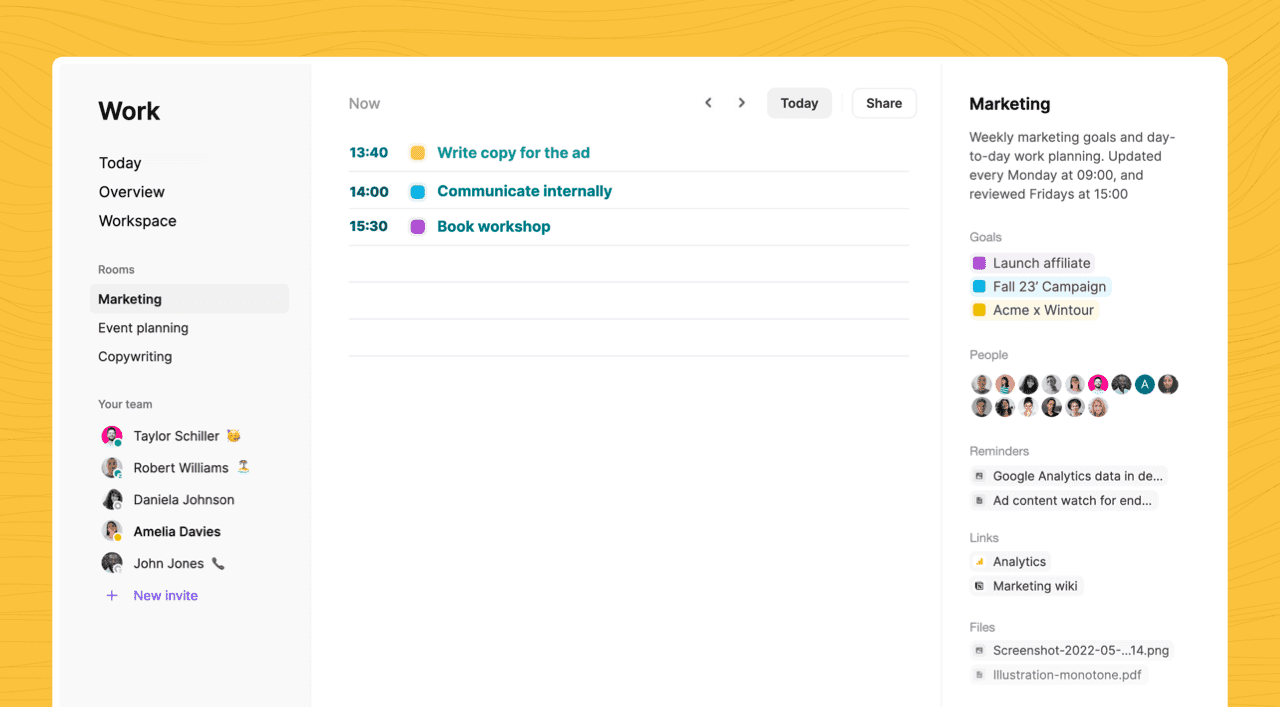Pembio
A curated collection of resources, worksheets and templates within the productivity space.
Get the app ✌️How to set small goals for yourself
It is an essential human drive to plan things we want to achieve, and then work toward achieving those objectives. Having big or small goals is an integral part of what makes life enjoyable, even if the road we take to complete them does not always go smoothly or efficiently.
Having goals provides a feeling of meaning and purpose, guides us in terms of direction we’d like to be heading, and gets us interested and involved in the things we are doing - all of which are aspects that contribute to our overall well-being and sense of purpose. Indeed, it has been shown that the likelihood of us reaching our goals increases if we set our goals in a thoughtful manner in the first place, which adds to the sense of feeling good about ourselves and our life.

Where to start
Here we will talk about how to set small goals for yourself in steps. These are the following:
Decide on a goal
Consider a goal or activity you want to accomplish in the future. It doesn't matter what it is, as long as you want to do it; ideally, it should be something you're interested in and/or feel excited about. It should be something you want to do for a reason.
It may be a large item or a very tiny thing, but sometimes it's simpler to start with something small. And it helps a lot if it's something that's just a little bit beyond what you can achieve right now – goals that push us to our limits may be quite inspiring!
Write it down
Carefully. The more clearly we articulate our objectives on paper, the greater the chance is that we achieve them. Also write down the criteria that you will use to determine your success in achieving your objectives, and the date by which you would want to be done.
Ask yourself: what it will look like and how you will feel after you've completed it, and answer those questions honestly. How does it relate to the people or items that are essential to your life? And be specific! Describe your objective in words that are precise and include a timeline.
So instead of saying “I want to do some gardening”, you might say “I want to plant lettuces, carrots, and peas in the vacant spot in my garden by the end of May”.
And rather than defining your objectives in terms of what you don't want, write them down as you actually do want. Rather than using a phrase like “I don't want to be overweight any longer”, you could stipulate that “I want to be able to wear my favorite pants again”.
Tell someone
According to research, telling another person we know and trust boosts the likelihood of us attaining our goals. It’s simply a way to add some accountability to your ambition - if someone else knows what you’re aiming for, you’re more likely to walk the extra mile to get there.
Break your goal down
This is particularly important if you’re going for a big goal. Consider the sub-goals you need to accomplish to reach the larger goal you have set for yourself.
So, if your aim is to lead a healthier lifestyle, and as part of that your goal is to run a 5 mile race in 6 months, you should break that goal down into smaller milestones. Breaking goals down into their parts allows us to be more particular.
Therefore, a more attainable objective may be running two times every week for 30 minutes. Put your shorter-term goals down on paper, and if you can, attempt to give yourself deadlines by which you must complete them. .
Having several more manageable objectives simultaneously makes it more likely that we will continue progressing toward the overall aim we have set for ourselves by providing us with a sense of accomplishment along the way.
Plan your first step
According to an old saying, it’s the first step on a trip that covers one thousand miles that is the most important. Even if your objective isn't to walk one thousand miles, just thinking about the journey's first step will be a big assist in getting you going. Even if you have no idea where to begin, don’t use that as an excuse to do nothing at all. Take the first step, and soon you’ll be building up momentum and progress towards your goal.
Keep going
Working towards our objectives might often be challenging and frustrating - thus, it is also a matter of being determined and persistent. If you find that a specific action isn't yielding the desired results, try something else that does. You can get some help if you ask others close to you for suggestions.
They may help you see a different way. We should consider several strategies to increase the likelihood of achieving our objectives. If you're genuinely stuck, stop and look through your original plan. If you need to change your aim - that's alright too. Then, reconsider a moderate next move…
Celebrate
When you finally accomplish your goal, give yourself time to celebrate and express gratitude to anybody who assisted you along the way. Think about the things that you found enjoyable and the things that you learned along the way.
Conclusion
The life we desire may be more clearly defined and achievable if we set goals for ourselves. We will always know where we are heading and why we want to get there if we establish our goals appropriately and follow through on them. Therefore, plan, get your hands dirty, and work on creating the life you've always imagined for yourself.
By: Johan Flodgren

The goal planning app that will skyrocket your productivity
A brand new productivity app - empowering you, or your entire team, to get the most important work done with stunningly simple goal planning.
Get started for free